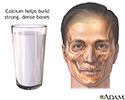Calcium and bones
Bone strength and calcium; Osteoporosis - calcium and bones; Osteopenia - calcium and bones; Bone thinning - calcium and bones; Low bone density - calcium and bones
Information
The mineral calcium helps your muscles, nerves, and cells work normally.
Your body also needs calcium (as well as phosphorus) to make healthy bones. Bones are the main storage site of calcium in the body.
Your body cannot make calcium. The body only gets the calcium it needs through the food you eat, or from supplements. If you do not get enough calcium in your diet, or if your body does not absorb enough calcium, your bones can get weak or will not grow properly.
Your skeleton (bones) are a living organ. Bones are constantly being remodeled with old bone being resorbed and new bone being formed. It takes about 10 years for all the bone in your body to be renewed. That is why paying attention to bone health is important in adults and not just in growing children.
Bone density refers to how much calcium and other minerals are present in a section of your bone. Bone density is highest between ages 25 and 35. It goes down as you get older. This can result in brittle, fragile bones that can break easily, even without a fall or other injury.
The digestive system is normally very bad at absorbing calcium. Most people absorb only 15% to 20% of the calcium they eat in their diet. Vitamin D is the hormone that helps the gut absorb more calcium.
Many older adults have common risks that make bone health worse. Calcium intake in the diet (milk, cheese, yogurt) is low. Vitamin D levels are low and gut calcium absorption is low. In many adults, hormonal signals have to take some calcium out of the bones every day to keep blood calcium levels normal. This contributes to bone loss.
Because of this, as you age, your body still needs calcium to keep your bones dense and strong. Most experts recommend at least 1,200 milligrams of calcium and 800 to 1,000 international units of vitamin D a day. Your health care provider may recommend a supplement to give you the calcium and vitamin D you need.
Some groups recommend much higher doses of vitamin D, but many experts feel that high doses of vitamin D are not safe for everyone. Be sure to discuss with your provider whether supplements are a good choice for you.
Follow a diet that provides the proper amount of calcium, vitamin D, and protein. These nutrients will not completely stop bone loss, but they will help ensure that your body has the materials it needs to build bones. Remaining fit and active can also protect bones and keep them stronger.
High-calcium foods include:
High-calcium foods
Calcium is the most plentiful mineral found in the human body. The teeth and bones contain the most calcium. Nerve cells, body tissues, blood, and ...

- Milk
- Cheese
- Ice cream
- Leafy green vegetables, such as spinach and collard greens
- Salmon
- Sardines (with the bones)
- Tofu
- Yogurt
References
Cosman F, de Beur SJ, LeBoff MS, et al. Clinician's guide to prevention and treatment of osteoporosis. Osteoporos Int . 2014;25(10):2359-2381. PMID: 25182228 www.ncbi.nlm.nih.gov/pubmed/25182228 .
De Paula FJA, Black DM, Rosen CJ. Osteoporosis and bone biology. In: Melmed S, Polonsky KS, Larsen PR, Kronenberg HM, eds. Williams Textbook of Endocrinology . 13th ed. Philadelphia, PA: Elsevier Saunders; 2016:chap 29.
Moyer VA; US Preventive Services Task Force. Vitamin D and calcium supplementation to prevent fractures in adults: US Preventive Services Task Force recommendation statement. Ann Intern Med . 2013;158(9):691-696. PMID: 23440163 www.ncbi.nlm.nih.gov/pubmed/23440163 .
Weber TJ. Osteoporosis. In: Goldman L, Schafer AI, eds. Goldman-Cecil Medicine . 25th ed. Philadelphia, PA: Elsevier Saunders; 2016:chap 243.
-
Calcium and bones - illustration
Calcium is one of the most important minerals for the growth, maintenance, and reproduction of the human body. Bones, like other tissues in the body, are continually being re-formed and incorporate calcium into their structure. Calcium is essential for the formation of and maintenance of healthy teeth.
Calcium and bones
illustration
-
Calcium and bones - illustration
Calcium is one of the most important minerals for the growth, maintenance, and reproduction of the human body. Bones, like other tissues in the body, are continually being re-formed and incorporate calcium into their structure. Calcium is essential for the formation of and maintenance of healthy teeth.
Calcium and bones
illustration
Review Date: 8/7/2016
Reviewed By: Brent Wisse, MD, Associate Professor of Medicine, Division of Metabolism, Endocrinology & Nutrition, University of Washington School of Medicine, Seattle, WA. Also reviewed by David Zieve, MD, MHA, Isla Ogilvie, PhD, and the A.D.A.M. Editorial team.

